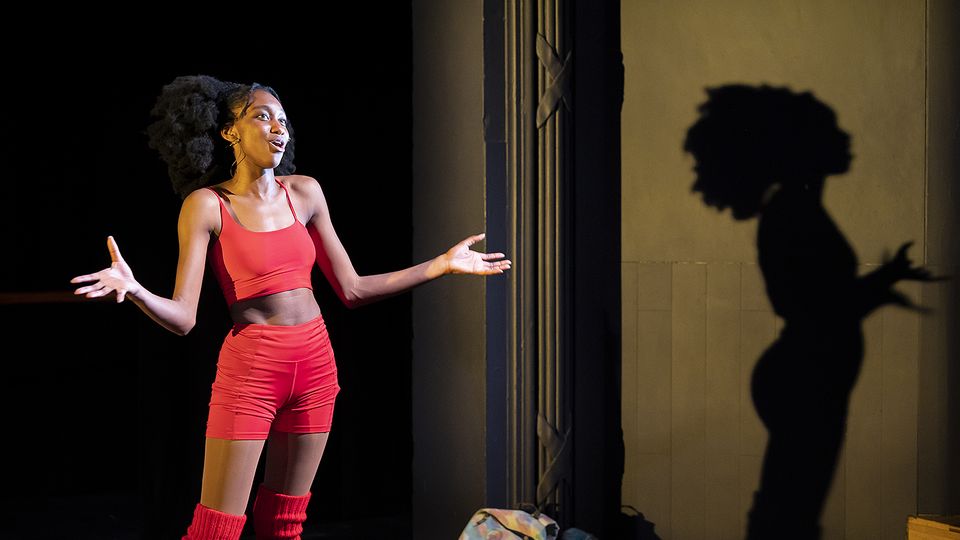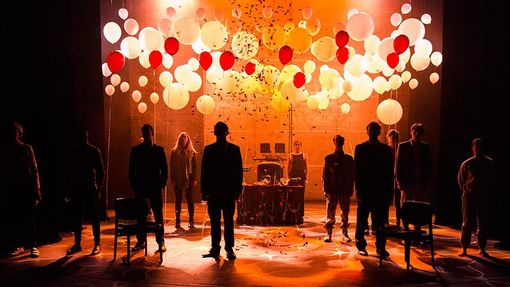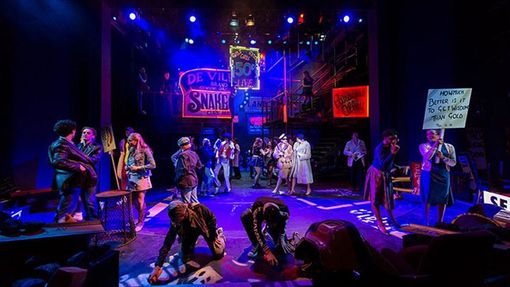
When you audition for Central’s BA (Hons) Acting programme, you will be considered for all three pathways. Acting: Acting, Acting: Collaborative and Devised Theatre, and Acting: Musical Theatre. There will be a representative from each pathway on the panel. With the help of our panellists, we’ve compiled the top 10 tips to help you prepare for your audition.
Choose monologues that you connect with
You may perform your monologues more than once, so choose pieces you love and won’t tire of. The pieces you choose reveal something about the actor/artist you are, the kinds of plays and writers that inspire and excite you, the parts you want to play and where you see yourself within the acting industry. It’s better to choose material and characters close to you in age and life experience. We welcome you to play with gender roles and identities. Most importantly, we want to see how YOU connect and engage with the character and their circumstances.
Know your character - and read the whole text!
Make sure you read the whole play in detail and fully understand the context of the speech within the wider story. The panel may ask you questions about the character’s journey.
Think about the ‘given circumstances’ of the play, for example, where is your character? When? Why? What do they want (their objective)? How will they get what they want (and what tactics will they use)? What is preventing them from achieving this (the obstacle)? Pick a piece that allows you to define a simple objective for your character. Be as detailed in this process as you can and it will show in your work.
Think less about the emotion you want to portray and more about the emotional impact you want to have.
Be willing to take risks
For the first round of auditions, you will need to prepare a devised piece. This is your chance to show us your individual creative voice.
Remember to be structured: what is the main question you want to ask your audience? Consider the best way to tell your story: is it through language, movement, music, puppetry, combining forms? This is a space to take risks. Don’t worry about it being ‘right’. Have fun creating something that you would want to see.
It’s not just for the devised piece that we want to see a willingness to take risks. In subsequent audition rounds, you’ll be expected to experiment with approaches and exercises you may not have tried before!
Singing is about storytelling
Singing in theatre is all about story-telling. The technical elements of singing training are in place to support the acting choices.
For Acting and Acting: Collaborative and Devised Theatre, panellists want to see how you connect to the material. Commit to the song, be willing to make a mistake and, as with your monologue, consider who you are singing to and what you want them to do with your words.
Panellists for the Acting: Musical Theatre pathway will also be looking out for vocal clarity, musical understanding, pitching and vocal quality. For Musical Theatre, we are not looking for perfection, however we will be listening out for vocal and musical potential and whether your voice is trainable for development to professional musical theatre standards over a three-year period.
You do not need to be a classically trained dancer
Though we welcome people from dance backgrounds, you do not need to be a trained dancer for any of our three Acting pathways. For all three courses, we want to see how you physically connect to the materials you bring, how you embody the texts and connect with other partners in the scene.
For Acting: Collaborative and Devised Theatre, we are looking for people who want to use their bodies to tell stories. This doesn’t mean you have to be a dancer, rather that you are open to responding with the body and are up for physical, movement-based training.
If you’re recalled for the final round of auditions for Acting: Musical Theatre, we will see how you engage with a taught dance routine. We want you to have fun and make it your own.
Don’t worry about your acting CV
You don’t need to be an expert in Shakespeare or have huge amounts of experience on stage or screen. Some people arrive to training with years of youth theatre and acting exams under their belts, and some have never been to the theatre before.
We want to build an ensemble of people from all kinds of backgrounds. We are looking for people who are open to learn and new experiences, are curious about theatre-making as well as being passionate about acting, have ideas about the kind of performance they want to make, are up for challenging themselves with text, physicality, and through devising and, perhaps most importantly, can play.
Bring openness and a desire to try new things
Come ready to play, experiment, and collaborate with others. Although it’s a competitive process, the audition is not a competition with your fellow candidates. Be ready to listen, learn, and have fun together.
Panellists for Acting: Collaborative and Devised Theatre may ask you to work physically and with imaginative imagery and prompts. This isn’t to trick you, it’s to see how willing you are to take risks and find new things out about the character by working in a more experimental way. We are inviting you to give it a go and see what you may find. Having said all that, if something doesn’t make sense to you or isn’t clear, please do ask us. The panel are there to guide and support you.
This is a learning opportunity
Redirection is there to ascertain whether you can be flexible in your choices, so go with it and be brave. In the first round panellists will have seen what you have prepared and how you have prepared it. In the second and third (final) round they want to see how you can shift from learned patterns and how you respond to their methodologies.
You may be recalled for one, two or all three of the BA (Hons) Acting courses and candidates are sometimes surprised by which course(s) have recalled. We invite you to go with it and have fun. You may very well find that this pathway is the right one for you and panellists will have identified your strengths as a performer and recalled you for the course(s) they believe would best benefit you.
Try to see the audition as a dialogue with us: you are also finding about Central, who we are, and what we stand for.
Look after yourself mentally and physically
Eat well and try to get a good night’s sleep before the audition. Bring water with you and make sure you stay hydrated. Aim to be slightly early for the audition as then you know where the building is, have a moment to chill, and get your bearings. Do something in the morning or the night before that helps you prepare, such as 5 minutes of meditation on an app or follow a yoga video on YouTube.
We recommend you warm your voice up before you arrive. There are lots of resources online for how to do this too.
If at first you don’t succeed…
Try, try again!
Unfortunately, the acting industry is full of rejections. Even the most successful actors are used to being turned down regularly at some point in their career. If you don’t get into drama school there may be a myriad of reasons. Some applicants try for a few years before they get in and this shows us that they are resilient and determined to be actors. It demonstrates that they have the qualities that you need to have a sustainable career in the acting industry.
Give yourself a day or two to feel disappointed and then start to think about the things you can do to positively implement the feedback- sometimes it’s just about having another year of life experience.
Rejection is always painful but don’t be disheartened. You can request feedback on your last unsuccessful audition with us and panellists will have written detailed notes on your performances and work in the room. These notes are an opportunity to learn and develop your artistic practice. We will detail how you can request feedback during your audition.


